Cite this document
(“Karl Marx about alienation Essay Example | Topics and Well Written Essays - 1250 words”, n.d.)
Retrieved from https://studentshare.org/philosophy/1573565-karl-marx-about-alienation
Retrieved from https://studentshare.org/philosophy/1573565-karl-marx-about-alienation
(Karl Marx about Alienation Essay Example | Topics and Well Written Essays - 1250 Words)
https://studentshare.org/philosophy/1573565-karl-marx-about-alienation.
https://studentshare.org/philosophy/1573565-karl-marx-about-alienation.
“Karl Marx about Alienation Essay Example | Topics and Well Written Essays - 1250 Words”, n.d. https://studentshare.org/philosophy/1573565-karl-marx-about-alienation.


